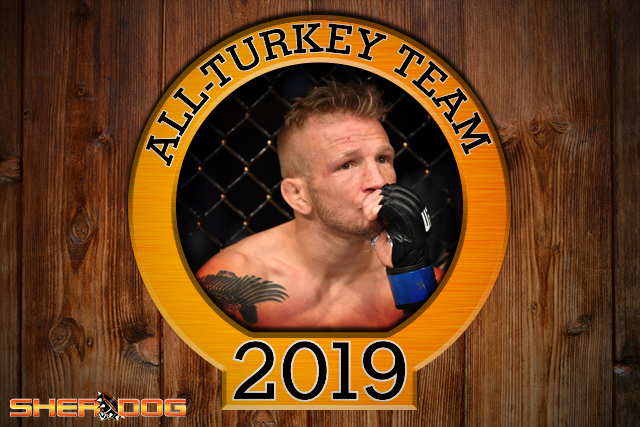An MMA Thanksgiving: 2019 All-Turkey Team
Competitive Disadvantage

Ben
Duffy/Sherdog.com illustration
T.J. Dillashaw
Fans have grown accustomed to fighters who torpedo their careers by trying to gain a competitive edge illegally, so when Dillashaw was flagged and subsequently suspended for his use of the performance-enhancing drug recombinant human erythropoietin. The former Ultimate Fighting Championship bantamweight titleholder will spend the next two years on the sidelines, ineligible to return to competition until Jan 19, 2021.
To make matters worse, crashed and burned in his bid to become a simultaneous two-division champion at UFC Fight Night Fight Night 143 -- the bout for which Dillashaw tested positive -- on Jan. 19 in Brooklyn, New York, as he succumbed to punches from flyweight titleholder Henry Cejudo just 32 seconds into their main event. Cejudo fired out of the gates, pairing leg kicks with rapid-fire punches upstairs. He pushed an off-balance Dillashaw backward, wobbled him with a partially blocked head kick and dropped him to all fours with a well-placed right hand behind the ear. Cejudo followed up with a ferocity he had rarely shown, even as his dazed counterpart reached for a single-leg out of pure desperation. Dillashaw was met with unanswered rights and lefts to the head, leading referee Kevin MacDonald to call for the stoppage despite his protests.
Roughly two months later, Dillashaw vacated the bantamweight championship when it was revealed he flunked pre- and post-fight drug screens.
“We all know the pressures to win at all levels of all sport are real and intense,” United States Anti-Doping Agency CEO Travis T. Tygart said. “It is exactly why strong anti-doping efforts are necessary to protect clean athletes’ rights, health and safety and to ensure that those who do succumb to these pressures and decide to break the rules will be held accountable in a real and meaningful way, as in this case.”
Continue Reading » Not So Cuddly








